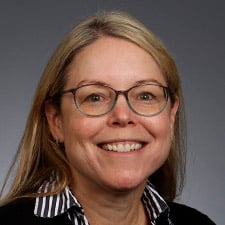As health system leaders create programs to help physicians struggling with burnout, it turns out that there’s an additional step: Making them feel safe to access the medical care they need to stay healthy and keep practicing medicine.
That includes mental health care, which many physicians have been discouraged from seeking for fear that doing so would endanger their chances of being credentialed—or recredentialed—due to overly intrusive and irrelevant credentialing application questions. Changing such intrusive questions is part of fashioning a menu of different approaches to well-being in the hopes that more physicians will find help.
Laura Ryan, MD, is an emergency medicine physician, wellness director and peer coach for Northwest Permanente in Portland Oregon. She said making this kind of change requires the right kind of environment to prioritize physician well-being in such a holistic way.
Northwest Permanente is a member of the AMA Health System Program, which provides enterprise solutions to equip leadership, physicians and care teams with resources to help drive the future of medicine.
“We're so fortunate to have our CEO and executive leadership team, who are all incredibly supportive in putting wellness first [and] in devoting a tremendous amount of resources toward it,” Dr. Ryan said during a well-being AMA Insight Network event.
Among other benefits, members of the AMA Health System Program have access to the AMA Insight Network’s Quality, Safety and Equity community. This virtual forum provides an opportunity for like-minded leaders from across the country to hear more examples of how leading systems are finding innovative ways to address health care inequities in their communities.
The AMA’s Joy in Medicine™ Health System Recognition Program, “that foundational approach where we have everybody aligned, is one example. But even before that, we had support for individual wellness endeavors,” she said.
Mark Schildt, MD, chief wellness officer and medical director for El Rio Health in Tucson, Arizona, and Katie Schneider, MD, system medical director for provider well-being and a hospitalist for St. Luke’s Health System in Idaho, also appeared to discuss their work with the Joy in Medicine program.
All agreed that physician well-being is a constantly moving target that requires a team effort.
At Northwest Permanente, “many different levels of leadership, engagement and communication” play key roles in addressing physician well-being, Dr. Ryan said.
As the leader in physician well-being, the AMA is reducing physician burnout by removing administrative burdens and providing real-world solutions to help doctors rediscover the Joy in Medicine.
Credentialing changed to support well-being
While it’s important for patients’ safety to identify physicians who have a current impairment, questions that state boards, hospital credentialing committees or insurers may ask about past diagnoses or treatment have little or no bearing on a physician’s current fitness to practice medicine, the AMA says.
The AMA supports language that asks: “Are you currently suffering from any condition that impairs your judgment or that would otherwise adversely affect your ability to practice medicine in a competent, ethical and professional manner?” (Yes/No.)
An AMA Advocacy Resource Center brief, “Campaign to support medical student, resident and physician health and well-being” (PDF) explores why stigmatizing language needs to be removed, outlines how organizations can go about identifying things that needs to be changed and gives examples and guidance on how to make changes.
There are statewide credentialing and recredentialing applications used by Oregon health care institutions, including Northwest Permanente, which are issued by the Oregon Health Authority.
The Oregon Medical Board dropped the intrusive mental health questions on its medical licensure application in 2023. That move helped the statewide credentialing committee of the Oregon Health Authority’s efforts to improve its credentialing and recredentialing applications, said Dr. Ryan. She added that the unanimous vote by the credentialing committee of the Oregon Health Authority to drop intrusive mental health questioning was due to accessing resources from a variety of areas, including the Dr. Lorna Breen Heroes’ Foundation.
Oregon Health Authority’s credentialing committee created a work group with two physicians and a credentialing specialist to tackle the issue.
“We worked together to look at what would be the barriers, in terms of people's fears about liability and credentialing regulations, to really understand anyone's objections,” she said. The vote, when it came, “was so anticlimactic. Everybody was like, ‘Sure, yeah, of course we're going to remove it.’ … But I think that we prepared really well, and we met any perceived objections head-on.”
The new language is worded as: “We recognize that providers encounter health conditions, including those involving physical and mental health and substance use disorders, just as their patients do. It is imperative that providers address their health concerns for their own well-being as well as for patient safety. Do you attest to no current physical, mental health or chemical dependency conditions (alcohol or other substances) that currently affect your ability to practice, with or without reasonable accommodation?” (Yes/No).
Tackling burnout on every front
When it comes to physician burnout, Northwest Permanente is sold on the importance of making changes. Though the nation’s physicians are reporting less burnout than they were during the historically bad early years of the COVID-19 public health emergency, rates continue to be high and troubling—48.2% of physicians reporting symptoms of burnout in 2023.
The AMA’s exclusive survey also showed that 35.7% of physicians said they had moderate interest in leaving their current jobs within the next two years, or that they would like to or definitely would leave in that time period. For those looking to “sell” the value of well-being efforts to executives, fears about turnover may make converts of even the most reluctant, experts said at the AMA Insight Network event.
Helping “second victims” of trauma
“This talk of systemic wellness, it's going to be slow, and it isn't going to meet every department's needs or every individual's needs equally at every time,” Dr. Ryan said. “We know that the process of change is slow, but people sometimes need that individual, immediate support for their well-being.”
In response, Northwest Permanente developed a peer-support program in 2020 to help physicians and other health professionals who experience vicarious trauma through what is often called “second victim syndrome.” Being involved in an unexpected adverse patient event can trigger feelings of self-doubt, helplessness, fear and sadness.
“Your limbic activation can occur due to direct personal experience or witnessing somebody else's traumatic experience,” Dr. Ryan explained, noting that these physicians also need assistance working through their feelings about what happened.
Now, Northwest Permanente has 29 health professionals offering peer support in a program that provides confidential, nondiscoverable, free, virtual and immediate help on any topic of importance. They are trained yearly with an orientation and refresh on the relevant skills, Dr. Ryan said. Peer support can be accessed contiguously with therapy services and, thus far, has helped 100 people.
“We're seeing people respond and use it,” Dr. Ryan said. “This is really talking about emotional processing and offering that connection and support that can really help people avoid developing PTSD, from feeling isolated by a trauma and providing that resource that will keep people in their careers [and] hopefully, keep them from a worse outcome.”
Improving well-being is ongoing work
The Joy in Medicine program, according to Dr. Ryan, provides the kind of framework that supports making well-being a priority. Buy-in from leaders, communication and a continued commitment to change keeps the topic at the front of mind.
“As our needs as an organization have shifted with the changing climate … we have focused more on the systemic wellness platform and we are weaving that through everything that we do,” Dr. Ryan said. “This platform provides a great way for bi-directional communication between our front-line staff and our leadership, so that everybody knows what's happening.”
Download the 2024 AMA Joy in Medicine™ magazine (log into your AMA account to view) to see whether your organization is part of the prestigious group of 130 organizations across 35 states that are currently recognized for their dedication to physician well-being.
Abstract submissions for the 2025 American Conference on Physician Health—which takes place Sept. 11–13 in Boston—are now open through Feb. 14. Physicians, medical students, residents and fellows are invited to submit abstracts on strategies that prioritize physician well-being, clinical efficiency practices and systemic changes that promote a healthy work environment in health care. Inspire change today and submit an abstract.





